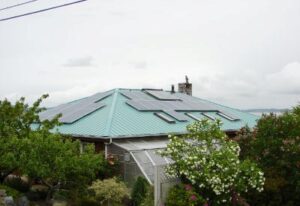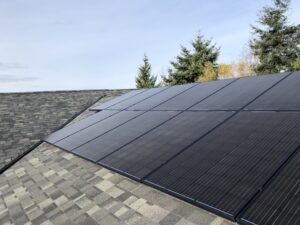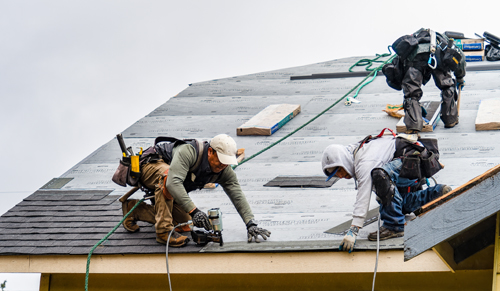Claiming the Solar Tax Credit for Your New Roof
Claiming the Solar Tax Credit for Your New Roof
Disclaimer: We are solar people not tax professionals. The information provided here is not intended as professional tax advice or guidance. If you have questions about the information presented, please consult with your tax professional or the IRS.
 For many homeowners, going solar is an exciting opportunity to save on monthly energy bills, increase their independence, and reduce their carbon footprint. The Investment Tax Credit (ITC), also known as the federal solar tax credit, can make this investment an even better deal.
For many homeowners, going solar is an exciting opportunity to save on monthly energy bills, increase their independence, and reduce their carbon footprint. The Investment Tax Credit (ITC), also known as the federal solar tax credit, can make this investment an even better deal.
A tax credit is a reduction in the amount of taxes you owe, which could result in a refund or it may just reduce the taxes you end up owing. It is important to understand that if you owe no taxes the Solar ITC will be of no value to you. You must owe taxes to benefit from it.
Wondering if investing in solar is right for you? Read: Is Solar a Good Investment?
Myths, Misunderstandings and Deception Around the Solar ITC
One of the most persistent and potentially serious myths about installing solar on your home is that if you need to replace your worn-out roof before installing a new solar system, you can take the Solar ITC on the cost of your new roof. So, let’s just cut to the chase:
“Can I Claim the Solar Tax Credit on My New Roof?”
The answer is an emphatic ‘No’, with a caveat.
How Did This Myth Get Started?
The original language in the IRS tax law was a little bit confusing, which left the door open for some creative interpretation even for reputable solar contractors. The confusion came in because of the language around building integrated photovoltaics (BIPV), also know as solar roof tiles. The IRS language was intended to clarify that BIPV is eligible for the tax credit, not to imply that any roofing material was eligible.
Tax form 5695 states that: “No costs relating to a solar panel or other property installed as a roof (or portion thereof) will fail to qualify solely because the property constitutes a structural component of the structure on which it is installed.”
This is the aforementioned caveat. Building Integrated Photovoltaics are eligible even though they are also part of your roof. The tax law has always clearly stated that the qualifying expenses are for equipment, services and labor necessary to install a solar system involved in generating electricity were eligible. BIPV qualifies because it is solar that generates electricity, not because it is a roofing material.
Clearing Up the Confusion
As often happens with laws and codes, once put into practice it was recognized that additional clarification was needed. The IRS Energy Incentives for Individuals: Residential Property Updated Questions and Answers provides perfect clarity:
“Q: Is a roof eligible for the residential energy efficient property tax credit?

A: In general, traditional roofing materials and structural components do not qualify for the credit. However, some solar roofing tiles and solar roofing shingles serve as solar electric collectors while also performing the function of traditional roofing, serving both the functions of solar electric generation and structural support and such items may qualify for the credit. Components such as a roof’s decking or rafters that serve only as roofing or structural function do not qualify for the credit.”
What Is Eligible for the Solar Investment Tax Credit?
The great news is that even though you can’t take the solar tax credit on your new roof, you can take it on all the costs associated with installing a solar system (and integrated energy storage), which can add up to big savings for you. The U.S. Department of Energy, Homeowner’s Guide to the Federal Tax Credit for Solar Photovoltaics states:
“The following expenses are included:
- Solar PV panels or PV cells used to power an attic fan (but not the fan itself)
- Contractor labor costs for onsite preparation, assembly, or original installation, including permitting fees, inspection costs, and developer fees
- Balance-of-system equipment, including wiring, inverters, and mounting equipment
- Energy storage devices that are charged exclusively by the associated solar PV panels, even if the storage is placed in service in a subsequent tax year to when the solar energy system is installed (however, the energy storage devices are still subject to the installation date requirements)
- Sales taxes on eligible expenses.”
Protect Yourself
If any solar company tells you that you can take the solar ITC on your roof, beware. The company may not be willfully trying to mislead you, but a solar professional should know the correct information about this important solar incentive, even though they are not tax professionals. And, unfortunately, we have heard of a few solar companies who are intentionally misinforming clients to get a sale.
 How can they get away with doing it? With very careful wording, and because they are not the ones filing your tax return. In the event you are audited you are the one on the hook for any penalties, fines or legal action, because it’s your signature on your return.
How can they get away with doing it? With very careful wording, and because they are not the ones filing your tax return. In the event you are audited you are the one on the hook for any penalties, fines or legal action, because it’s your signature on your return.
Looking for a solar contractor, but not sure how to choose one that is qualified and reputable? Here’s some help: Questions to Ask Before Selecting a Solar Installer

